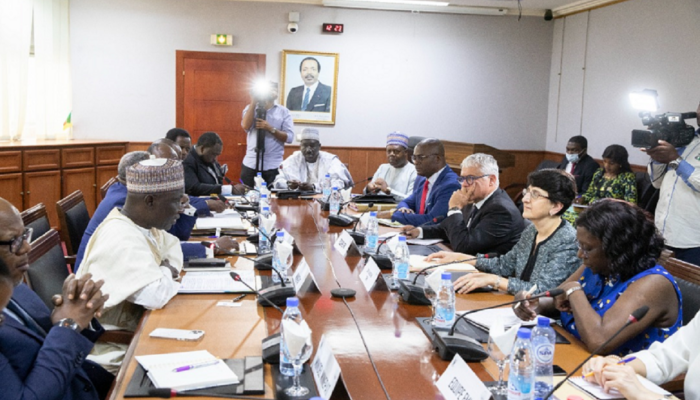The Cameroonian government has submitted to Parliament its draft budget for 2025, estimated at 7,317.7 billion CFA francs, a slight increase compared to 2024. This envelope places emphasis on public investment, with an increase of 16.1% in this area, while relying on growth in the non-oil sector.
The draft budget of the Cameroonian State for the financial year 2025 shows a total envelope of 7,317.7 billion CFA francs, an increase of 39.6 billion CFA francs (+0.5%) compared to the year 2024. This increase is mainly due to the increase in the general budget, which goes from 7,212.5 billion CFA francs in 2024 to 7,250.8 billion in 2025 (+0.5%). As for the Special Allocation Accounts (CAS), they record an increase of 1.5%, to reach 66.9 billion CFA francs.

The government is counting on a growth rate of 4.1% in 2025, supported by strong growth in the non-oil sector (+4.3%). This sector largely compensates for the persistent contraction in oil activity, forecast at -1% in 2025, compared to -2.6% in 2024. This decline is explained by a decrease in oil production and a fall in world prices per barrel.
To finance this ambitious budget, Cameroon plans to provide 5,548.1 billion CFA francs in internal revenue and donations, an increase of 313.1 billion CFA francs (+6%) compared to 2024. On the other hand, oil revenues, estimated at 734.8 billion CFA francs, fell by 8.3% due to the fall in the price of a barrel and the dollar against the CFA franc.
The investment budget for 2025 is particularly strengthened, reaching 1,863.1 billion CFA francs, an increase of 259 billion CFA francs (+16.1%) compared to 2024. It represents 33.48% of total expenditure, reflecting the government’s desire to maintain a development dynamic despite a constrained budgetary context.
With this budget, Cameroon intends to pursue its economic development by consolidating its public finances. The challenge, however, remains to maximize non-oil revenues and reduce its dependence on hydrocarbon revenues.
Budget Breakdown
The 2025 budget includes two primary components:
- General Budget: Projected at 7,250.8 billion FCFA, an increase of 38.3 billion FCFA (0.5%) from 2024.
- Special Appropriation Accounts (CAS): Estimated at 66.9 billion FCFA, slightly up by 1.3 billion FCFA (1.5%) compared to 2024.
This slight overall growth reflects the government’s aim to stabilize public finances while fostering targeted investments.
Economic Growth Projections
The budget assumes that Cameroon’s economic growth will improve from 3.8% in 2024 to 4.1% in 2025, driven primarily by the non-oil sector, which is expected to grow by 4.3%. This growth builds on previous gains of 4.1% in 2024 and 3.6% in 2023.
However, the oil sector remains in decline, with a projected contraction of -1.0% in 2025, following an estimated -2.6% in 2024. This downturn is attributed to declining oil production, falling global oil prices, and the weakening parity between the US dollar and the CFA franc.
Revenue and Investments
The government anticipates 5,548.1 billion FCFA in domestic revenue and grants, an increase of 313.1 billion FCFA (6%) from 2024. However, oil revenues are expected to drop by 66.8 billion FCFA (8.3%), with estimated earnings of 734.8 billion FCFA in 2025.
To compensate, Cameroon plans to focus on public investments, with the investment budget rising to 1,863.1 billion FCFA, up by 259 billion FCFA (16.1%) from 2024. This represents 33.48% of total budget expenditures in 2025, demonstrating the government’s commitment to infrastructure development and economic diversification.
Challenges and Opportunities
Despite the modest increase in the overall budget, the government faces challenges:
- Declining Oil Revenue: With oil prices and production expected to fall, Cameroon’s reliance on the non-oil sector for growth becomes increasingly critical.
- Debt Management: Cameroon aims to maintain fiscal stability while continuing its debt repayments, as evidenced by its efforts in 2024, where 65% of its debt repayment target was met by September.
However, the 2025 budget also highlights opportunities:
- Increased Public Investments: The significant rise in the investment budget signals a focus on infrastructure, job creation, and economic resilience.
- Non-Oil Sector Growth: With steady growth in agriculture, manufacturing, and services, the non-oil sector is poised to drive economic development.
Government Priorities
The government’s 2025 financial strategy focuses on:
- Sustaining Public Investments: Boosting infrastructure and economic projects to stimulate growth.
- Stabilizing Public Finances: Ensuring prudent fiscal management to avoid excessive deficits.
- Mitigating Oil Dependency: Diversifying revenue streams to reduce reliance on oil earnings.






